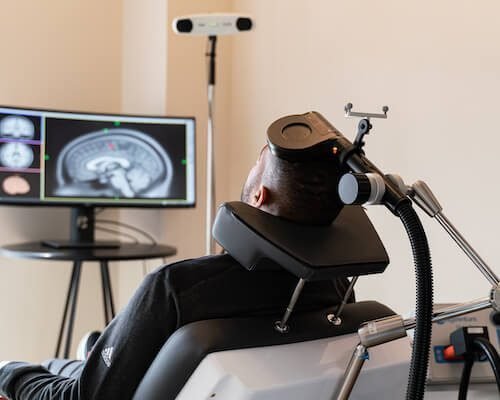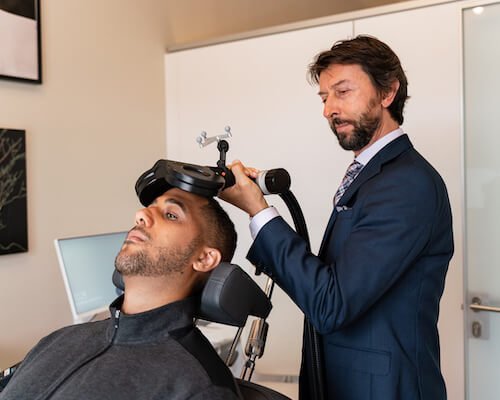TMS in neurological disorders
GIA’s ultimate goal is to improve the whole quality of life of the patient, their family, and caregivers by using a personalized and comprehensive whole brain-body approach.
GIA’s world-class team of experts develop highly tailored treatment plans for each client’s unique needs and goals. GIA treatment plans often include a combination of the following interventions:
- Transcranial magnetic stimulation
- Lifestyle and nutrition recommendations
- Psychological and educational support for the client and family members
- Management of medications as needed


Repetitive Transcranial Magnetic Stimulation (rTMS) is a recognized treatment for many neurological conditions. rTMS has been used successfully to treat:
- Mild cognitive impairment (MCI)
- Alzheimer’s disease – AD (mild to moderate, early stage)
- Parkinson’s disease – PD (motor and some non-motor symptoms)
- Chronic pain
- Migraine
Dementia & Alzheimer's Disease
Dementia is an umbrella term for several conditions that cause a progressive decline in memory and cognitive functions. Dementia is a condition that occurs in several neurological disorders, such as Alzheimer’s disease, Parkinson’s disease, vascular dementia, and Lewy Body dementia.
Common Warning Signs of Early Dementia
- Forgetfulness (misplacing items, missing appointments, repeating the same topic or question);
- Difficulty with familiar tasks (dressing, making coffee, brushing teeth, using appliances);
- Language difficulties, such as referring to common items as “thing” or “that”, or difficulty forming a long sentence or understanding instructions;
- Confusion about time and place;
- Frequently forgetting the date or the day of the week;
- Impaired judgement (not taking usual precautions such as turning off the stove, wearing the wrong clothes for the season or driving erratically)
- Changes in personality and mood (agitation, irritability, suspiciousness, being socially inappropriate, losing interest in usual activities)
Read more: What is the cost of TMS Therapy?
Dementia can begin as either a gradual or a sharp decrease in memory, accompanied by the inability to retrieve words or name things and difficulty performing daily activities. Dementia may also cause personality changes and mood problems.
Some forms of dementia can be reversible, such as those related to hormonal or vitamin deficiencies. Most forms of dementia do not have a cure. However, treatment can improve symptoms and slow or halt the progression of dementia.

TMS is effective in slowing and minimizing the symptoms of dementia. TMS can reduce dementia symptoms in ways that other interventions are not. GIA Miami’s personalized TMS treatment protocols can improve memory and cognitive functions directly by stimulating the activity of brain regions located in the frontal and parietal lobes. These regions are called the dorsolateral prefrontal cortex and precuneus. GIA’s personalized TMS treatment offers a valuable method to slow down the worsening of symptoms and improve the quality of life of people with Alzheimer's disease and dementia, as well as their families are caregivers.
Read more: Pros and Cons of TMS Therapy
Parkinson's Disease
Parkinson's disease (PD) is a progressive neurodegenerative disorder caused by the breakdown of dopamine-producing cells in the brain, specifically in a region called the substantia nigra pars compacta. The resulting decrease in dopamine produces motor symptoms characterized by resting tremor, bradykinesia (slowness of movement), rigidity, difficulty moving, and trouble balancing. In addition to motor symptoms, Parkinson's disease includes non-motor symptoms such as cognitive impairment, depression, anxiety, autonomic dysfunctions (cardiovascular, gastrointestinal, urinary and other symptoms), and sleep problems. These symptoms have inevitable consequences on the quality of life of those who suffer from Parkinson’s disease and their caregivers.
Read more: Success rate of TMS Therapy
Repetitive transcranial stimulation (rTMS) is a non-pharmacological and non-invasive treatment option for patients with Parkinson’s disease. Numerous clinical studies have shown that rTMS can improve both motor and non-motor symptoms such as depression, anxiety and pain that usually do not respond to medication.

